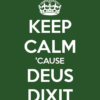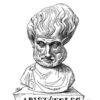Tag: being
No Human Freedom Outwith Participatio Christi: On an Order of Being to Evangelicum
Karl Barth being rightfully critical of a reformed Federal or Covenantal theology. Here we see what it looks like to think from a noncompetitive relationship between God and humanity; and to simply think humanity from God’s life for us. It is God who is genuinely free in His inner and eternal life, and not us (‘Not unto us, not unto us, but to God be the glory’ Ps 115). It is God’s being in becoming for us, wherein the “us” comes to have the type of creaturely, and thus contingent independence (as TFT would say it) vis-à-vis God that the…
On Being the Listening Church: How Dialectical Theology, Properly Understood, is Dialogical Theology
What is dialectical theology? Barth is often referred to as a dialectical theologian; especially the earlier Barth. Some want to implicitly criticize Barth by asserting that because Barth was a dialectical theologian, he, eo ipso was a Hegelianizing theologian (i.e., putting Hegel’s dialectic to work for his theologizing). And yet, Barth is much more original than that. He was clearly a modern theologian, as is anyone who currently does theology in the 21st century. Even so, his methodology was to allow Holy Scripture and its reality in Jesus Christ to regulate his deployment of any other mechanisms he might have…
No Chain of Being Between God and Humanity, Just Jesus
Christians don’t believe in a chain of being between God and the world. Christians believe that God in-breaks into the world with irruption that this world could never produce. Without God’s gracious and free election to invade this world, this humanity, we would have no access into God’s inner life; which is eternal life. The Christian believes in a life that was first set for them in the vicarious humanity of Jesus Christ; indeed, a life, a Deus incarnandus (‘God to be incarnate’), that was there ever before this world was this world. Deus incarnatus (‘God incarnate’) is humanity’s only…
Being in a Personal, Relational Relationship with God, On Triune Terms
God is not an analogue to analyze. God instead is a triune and eternal relationship of Father, Son, and Holy Spirit, one God (de Deo uno) in three persons (de Deo trino) to be inhabited, through Christ, and enjoyed. The Christian is in an immediate relationship with the triune God through union with Jesus Christ. We are indeed, as Christians, in an intimate and personal relationship with the living God. Not because we are persons in relationship with God—thus predicating what God’s relationality and personalist reality must be—but because God is eternally personal and [onto]relational within the inner-reality (in se)…
On Being a Real Protestant: Calvin and Barth against Thomas and the Thomists on a Vestigial Knowledge of God
Is God really knowable, secularly, in the vestiges of the created order? In other words, does God repose in the fallen order to the point that vain and profane people can come to have some type of vestigial knowledge of the living God? According to Thomas Aquinas, and other scholastics of similar ilk, the answer is a resounding: yes. Here is Thomas himself: as we have shown [q. 32, a. 1], the Trinity of persons cannot be demonstratively proven. But it is still congruous to place it in the light of some things which are more manifest to us. And…
On Being Apocalyptic and Anti-Natural Theology in Theological Orientation
I wrote the following four years ago. This locus remains my primary point of theological interest. That is, how the Christian claims to know God, under what pressures, has the greatest theological, political, sociological, and ethical implications we could fathom. As you will see, beyond the programmatic entailments engaged with in the following, natural theology, and adherence to it, has clear and present impact on the daily lives of real-life people; whether personally or collectively (as a society). If it is maintained that God and His ways can be known in an abstract ground latent in human reason, consciousness, or brute…
On Being a Dialogical Rather than a Static Christian Thinker
This post deals with some technical stuff that might not be interesting for all readers, but I find it quite instructive in better understanding why it is that Thomas Torrance rejects the determinism that shapes frameworks of thought like that found, theologically, within Arminianism and Calvinism. And it should also help to illustrate an alternative route to thinking about things in causally determinative ways; which implicates the ways that, in the West, in general, we have become most accustomed to think, even though someone like Einstein and his theory of relativity has demonstrated that reality, in fact does not work in…
On Being Child Like, Playful, and Joyous as the Christian’s Life of Theological Existence
All of life is theological, or it should be for the Christian. There isn’t one aspect of life, for me, that isn’t consumed by the love of Christ. And this, I think, is the basis for what ought to count as genuinely theological: viz. a life grounded in the prior reality that God in Christ first loved us that we might love Him. It is out of this constraint that the Christian’s life ought to be compelled to do all that it does and thinks from. Ever since I became a Christian, as a wee lad, I have had this…
On Being a New PhD student in Theology
I am now a PhD student “beginning” (in scare quotes, because I’ve been studying said subject matter since 2002 in earnest) research on a doctrine of grace in what I am calling the Protestant Church Fathers juxtaposed with the grace-ologies of Thomas Torrance and Karl Barth. I am somewhat riffing on this topic of research from TFT’s own PhD dissertation entitled A Doctrine of Grace in the Apostolic Fathers. I am finally undertaking this venture of study through the Concordia Academic Theology Consortium: Martin Luther School of Bible and Theology; the same institution (of the General Lutheran Church) that recently awarded me with…
Heads of churches in Holy Land voice objection to Mount of Olives being included in national park
After heads of churches in the Holy Land voiced their objections to a proposal to expand Jerusalem Walls National Park to include property owned by several churches in the city, Israel’s Nature and Parks Authority announced on February 21 that it was freezing the plan. The text of the Feb 18 letter from Patriarchs about the Mount of Olives can be found here. The Feb 23 World Council of Churches article about the situation can be found here. ELCA Blogs








